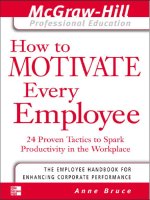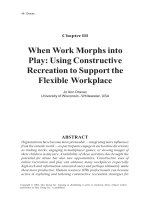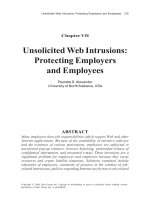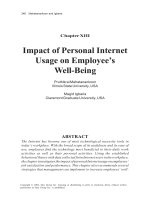your rights in the workplace 8th (2007)
Bạn đang xem bản rút gọn của tài liệu. Xem và tải ngay bản đầy đủ của tài liệu tại đây (3.81 MB, 550 trang )
8th edition
Your Rights in
the Workplace
by Attorney Barbara Kate Repa
Nolo’s Legal Updater
We’ll send you an email whenever a new edition of this book is
published! Sign up at www.nolo.com/legalupdater.
Updates @ Nolo.com
Check www.nolo.com/update to nd recent changes
in the law that affect the current edition of your book.
Nolo Customer Service
To make sure that this edition of the book is the most
recent one, call us at 800-728-3555 and ask one of
our friendly customer service representatives.
Or nd out at www.nolo.com.
The law changes, but Nolo is on top of it! We offer several
ways to make sure you and your Nolo products are up to date:
always up to date
2
1
3
We believe accurate, plain-English legal information should help
you solve many of your own legal problems. But this text is not a
substitute for personalized advice from a knowledgeable lawyer.
If you want the help of a trained professional—and we’ll always
point out situations in which we think that’s a good idea—consult
an attorney licensed to practice in your state.
please note
8th edition
Your Rights in
the Workplace
by Attorney Barbara Kate Repa
EIGHTH EDITION JULY 2007
Legal research TRISH KEADY
TERRY McGINLEY
ALAYNA SCHROEDER
Cover design SUSAN PUTNEY
Book design TERRI HEARSH
Proofreading ELAINE MERRILL
Index THÉRÈSE SHERE
Printing CONSOLIDATED PRINTERS, INC.
Repa, Barbara Kate
Your rights in the workplace / by Barbara Kate Repa. 8th ed., [rev.]
p. cm.
Includes index.
ISBN-13: 978-1-4133-0643-9
ISBN-10: 1-4133-0643-8
1. Labor laws and legislation United States Popular works. 2. Employee rights
United States Popular works. I. Title.
KF3455.Z9R47 2007
344.7301 dc22
2007002196
Copyright © 1994, 1996, 2000, 2002, 2005, and 2007 by Nolo.
ALL RIGHTS RESERVED. PRINTED IN THE USA.
No part of this publication may be reproduced, stored in a retrieval system, or transmitted
in any form or by any means, electronic, mechanical, photocopying, recording, or
otherwise without the prior written permission of the publisher and the author.
Reproduction prohibitions do not apply to the forms contained in this product when
reproduced for personal use.
For information on bulk purchases or corporate premium sales, please contact the Special
Sales Department. For academic sales or textbook adoptions, ask for Academic Sales. Call
800-955-4775 or write to Nolo, 950 Parker Street, Berkeley, CA 94710.
Acknowledgments
Many people—both outside and inside Nolo—gave their time, expertise, and wise
counsel to help make this tome possible initially.
This eighth edition is made possible by the many workers since then who have
shared their stories, their pains and gains.
My heartfelt thanks to all.
Table of Contents
1
Your Rights in the Workplace
Analyzing Your Options 2
Talking It Over With Your Employer 3
Documenting the Problem 4
Considering Legal Action 5
2
Wages and Hours
e Fair Labor Standards Act 8
Rights Under the FLSA 13
Calculating Your Pay 27
Calculating Workhours 28
State and Local Laws 37
State Minimum Wage Laws for Tipped and Regular Employees 39
Payroll Withholding and Deductions 73
Enforcing Your Right to Be Paid Fairly 90
Filing a Complaint or Lawsuit 90
Violations of State and Local Laws 91
3
Health Insurance
No Legal Right to Coverage 96
Coverage for Current Employees 97
Coverage for Former Employees 101
Individual Health Insurance 104
State Laws on Insurance Continuation 104
Utilization Review 118
4
Family and Medical Leave
e Family and Medical Leave Act 122
State Laws on Family Leave 130
e Pregnancy Discrimination Act 144
Work/Life Balance 147
5
Privacy Rights
Your Personnel Records 152
Workplace Testing 172
Surveillance and Monitoring 200
Searches and Seizures 207
Clothing and Grooming Codes 207
Conduct Codes 209
6
Health and Safety
e Occupational Safety and Health Act 214
Enforcing OSHA Rights 216
Criminal Actions for OSHA Violations 226
State and Local Health and Safety Laws 226
Tobacco Smoke in the Workplace 228
Pesticide Laws 232
Hazardous Substances Laws 246
Violence in the Workplace 246
7
Illegal Discrimination
Title VII of the Civil Rights Act 254
State Laws Prohibiting Discrimination in Employment 264
State and Local Anti-Discrimination Laws 279
e Equal Pay Act 287
e Age Discrimination in Employment Act 292
e Older Workers Benefit Protection Act 294
e Americans With Disabilities Act 296
Discrimination Against Workers With HIV or AIDS 306
Discrimination Against Gay and Lesbian Workers 307
8
Sexual Harassment
e Effects of Sexual Harassment 311
Federal Law 313
State Laws 316
Taking Steps to End Sexual Harassment 316
Where to Get More Information 320
9
Losing or Leaving a Job
e Doctrine of Employment at Will 322
When a Firing May Be Illegal 323
Employees’ Rights 338
Finding Out the Reason 338
Getting Documentation 341
Waiving Your Right to Sue 356
Taking Action Against Your Dismissal 357
Plant Closings 359
10
After a Job Loss
Your Final Paycheck 372
Severance Pay 372
State Laws at Control Final Paychecks 373
Getting References 380
Collecting Fringe Benefits 382
Outplacement Programs 383
Replacing Your Income 385
Agreements Not to Compete 388
Blacklisting 390
11
Unemployment
Who Is Covered 398
Being Disqualified for Benefits 399
Calculating Your Benefits 401
Filing a Claim 403
Appealing Benefit Decisions 407
12
Workers’ Compensation
Who Is Covered 411
Conditions Covered 412
e Right to Medical Care 415
Filing a Workers’ Compensation Claim 416
Calculating Benefits 416
State Workers’ Compensation Offices 418
Related Lawsuits for Work Injuries 423
13
Social Security Disability Insurance
Who Is Covered 426
Disabilities Covered 428
Dependents Entitled to Benefits 431
Filing a Social Security Claim 432
Appealing a Denied Claim 435
Collecting Other Benefits 436
14
Retirement Plans
Social Security Retirement Benefits 440
Private Pensions 443
401(k) Deferred Compensation Plans 449
15
Labor Unions
Federal Laws 454
State Laws 457
e Bargaining Unit 457
Types of Union Work Situations 459
Union Elections 460
e Right to Unionize 461
e Right to De-Unionize 462
Where to Get More Help 463
16
Immigration Issues
Federal Law 466
Documentation Required to Work in the U.S. 467
Illegal Discrimination 468
English-Only Rules 469
17
Lawyers and Legal Research
Mediation and Arbitration 474
Small Claims Court 475
Class Action Lawsuits 476
Hiring a Lawyer 476
Legal Research 482
Appendix
Resources
Advocacy, Generally 492
AIDS-HIV 492
Civil Rights 493
Disabled Workers 493
Discrimination 494
Gay and Lesbian 495
Immigration 496
Labor Departments 496
State Labor Departments 496
Legal Referrals 500
Mediation and Arbitration 500
Older Workers 501
Retirement Plans and Pensions 501
Safety and Health Issues 501
Unions 502
Women’s Issues 503
Work/Life Issues 505
Index
CHAPTER
1
Your Rights in the Workplace
Analyzing Your Options 2
Talking It Over With Your Employer 3
Documenting the Problem 4
Considering Legal Action 5
2
|
Your rights in the Workplace
M
aybe you’re just curious. Or maybe
you’re the cautious type of soul
who likes to think ahead and
prevent a wrong before it happens. But the
best bet is that you are reading this book
because you already have a work-related
problem:
•Youwerenothiredforajobandyou
have good reason to suspect it was
because of your race. Or your disability.
•Youremployerpromotedaless-qualied
persontollapositionyouwere
promised.
•Youwanttoknowyourlegalrightsif
you consistently work overtime. Or if
you want to take a leave to care for a
sick parent. Or if you are called to serve
on a jury.
•Youhavejustbeenlaidoffandyou’re
wondering if you have the right to get
your job back. Or to get unemployment
payments in the meantime. Or whether
your employer owes you severance pay.
•Youwanttohelpevaluateanewjob
you’vebeenoffered.Oryouwanttond
out your legal rights as a jobseeker.
This book will help you understand the
legal rights that apply to your situation. It
explains federal workplace laws—such as those
guaranteeing your rights to be paid fairly and
on time and to work free from discrimination. It
also explains the twists state law may place on
your workplace rights—regulating, for example,
both your right to smoke and your right to work
in a smoke-free place, or whether or not you are
entitled to time off work to vote or to care for a
sick child.
Tackling a potential workplace problem
canfeeldifcult,soheedthatnobleadage:
Simplify, simplify. Better still: Simplify. Woe
unto the reader whose concerns span every
chapter. Proceed to the chapters that discuss
the substance of your problem and skip the
rest for now.
Also, be aware that there are many public
and private agencies, groups, and organizations
that specialize in workplace issues, and
many of them provide free—or low-cost—
counseling,support,orreferrals.Youwillnd
information on these organizations peppered
throughout the book, and a comprehensive
listing in the appendix.
Analyzing Your Options
If something is amiss in your workplace and
you have turned to watercooler wisdom,
commuter train tales, or locker room skinny,
you may have come away with the same
urging: Sue.
For most people, that is bad advice. The
courtroom is usually the worst place to
resolve workplace disputes. Most of them can
behandledmoreefcientlyandmuchmore
effectively in the workplace itself—through
mediation, arbitration or, most often, by
honest conversation.
If you have suffered an insult, an injury,
or a wrong at work, you are probably feeling
angry or hurt. If you have lost your job, you
maybehurtingnancially,too.Allofthis
is likely to cloud your ability to make well-
reasoned decisions. So go slowly. Decide what
CHAPTER 1
|
Your rights in the Workplace
|
3
you want to gain. If an apology from your
employerwouldsufce,saveyourselfthetime
andexpenseoflingalegalaction.
Talking It Over With
Your Employer
Do not overlook the obvious: First try talking
over your workplace problem with your
employer. An intelligent discussion can resolve
most wrongs—or at least get your differences
out on the table. Most companies want to stay
within the law and avoid legal tangles. So the
odds are that your problem is the result of an
oversight, a misunderstanding, or a lack of
legal knowledge.
Here are a few tips on how to present
your concerns to your employer or former
employer:
Know your rights. The more you know
about your legal rights in the workplace—to
be paid fairly and on time, to do your job free
from discrimination and retaliation, to labor in
asafeandhealthyplace—themorecondent
you will be in presenting your problem. This
book offers a wealth of information about
the basic laws of the workplace—and tells
youwheretoturnifyouneedmorespecic
information to clarify your rights.
Also, the book contains a number of charts
summarizing state laws on various workplace
rights,includingspecicpenaltiesthatmay
be imposed on employers who violate them.
Your best course is probably not to sue your
employeroveraviolationofalawrequiring
paid time off for jury duty or a single mis-
calculation of overtime pay. But knowing
whether a particular transgression can be
punishedwithane,acriminalconviction,
or an order to rehire you is the kind of
information that can make your employer
take your complaint more seriously in the
bargaining process.
Stick to the facts. Keeping your legal rights
rmlyinmind,writeabriefsummaryofwhat
has gone wrong and your recommendation
for resolving the problem. It often helps to
have someone who is more objective than
you are, such as a friend or family member,
review the facts of your workplace problem
with you and discuss possible approaches to
resolving it.
Check the facts again. The human memory
is not nearly as accurate as we like to think it
is—particularly when it comes to remembering
numbers and dates. Before you approach your
employer with a complaint about your pay,
check to be sure your math is correct. If your
beef is about a discriminatory remark, be sure
youcanquoteitverbatim.Reviewallofyour
written records to make sure you have not
overlooked a past event or pivotal memo.
Do not be overly emotional. Recognize
that dealing with a workplace problem can
be stressful. After all, if you are like most
workers, you spend about half of your waking
hours on the job. But you also know friends,
relatives,andacquaintanceswhoareoutof
work—andwhoarehavinghardtimesnding
new jobs. Acknowledge that these pressures
oftimeandmoneycanmakeitmoredifcult
to deal with a workplace problem. Then
vow to proceed as calmly and rationally as
possible.
4
|
Your rights in the Workplace
Stay on the job if possible. If your job is on
shaky ground, try not to jeopardize it further
bylosingyourtemperandgettingredasa
result. A calm presentation of a complaint is
always better than an emotional confrontation.
Remember the common wisdom that it is
easiertondanewjobwhileyoustillhave
your old one. At the very least, it’s easier to
blaze a new career trail if you leave no muddy
tracks behind you.
Be discreet. Discussions of workplace
prob lems are often very personal and
should take place privately—not in front of
coworkers. Employment problems can be
divisive not only for those involved, but for
an entire workplace. You don’t want to be
justly accused of poisoning the workplace
atmosphereorofllingitwithdisgruntled
workers forming pro and con camps. Ask for
an appointment to discuss your complaint
privately with your supervisor or another
appropriate manager. If you give that person a
chance to resolve your problem rationally and
privately, he or she will be more apt to see
things your way.
Documenting the Problem
Most employers now embrace the workplace
mantra reinforced by thousands of court
cases: Document, document, document. If
your good working situation has gone bad—
oryouhaverecentlybeenred—you,too,
must heed the call: Make a record, preferably
a written one, of all that happened. You are
nowhere, legally, without evidence of how
and when things went wrong.
A little bit of workplace paranoia may
later prove to be a healthy thing. Even if
everythingseemsnenow,taketheextra
seconds to create a paper trail. Collect in one
place all documents you receive on the job:
initial work agreements, employee handbooks,
management memos, performance reviews. To
besafe,keepyourleathome,awayfrom
theofce.
If you have what seems to be a valid
complaint, it is crucial to gather evidence to
bolster your claim. From the start, beware
ofdeadlinesforlingspecictypesoflegal
claims. The deadlines may range from a few
weeks to a few years but will likely signal that
youhavetoactquickly.
CAUTION
Watch what you grab. While it’s true
that you are in the best position to gather evidence
while you are still working, you must be wary of
what you take in hand. Confidential information,
such as evidence of the company’s finances, and
other documents that the employer has clearly
indicated should not be disclosed, are off limits.
If you take these kinds of documents out of the
workplace, that may actually become a legal ground
for the company to fire you—or for a court to limit
or deny your remedies for wrongful treatment you
suffered while on the job.
There are several kinds of evidence you
should collect as soon as possible.
Company policies. Statements of company
policy, either written or verbal, including
job descriptions, work rules, personnel
pamphlets, notices, or anything else that
CHAPTER 1
|
Your rights in the Workplace
|
5
either indicates or implies that company
policy is to treat workers unfairly may be the
most meaningful evidence you can amass.
A straightforward company policy can also
help bolster your case or complaint if you can
show that the policy promised something the
company didn’t deliver.
Written statements by management. State-
ments by supervisors, personnel directors, or
other managers about you are also important.
Save any written statements and note when
and from whom you received them. If you
have not received any written reasons for
a job decision you feel is discriminatory or
otherwisewrongful,makeawrittenrequest
for a statement of the company’s reasons.
Verbal comments. In many cases, employers
and their managers do not write down
their reasons for making an employment
decision. In such cases, you may still be able
to document your claim with evidence of
verbal statements by supervisors or others
concerning unwritten company policy or
undocumented reasons for a particular action
involving your job.
Make accurate notes of what was said as
soon as you can after the statement is made.
Also note the time and place the statement
was made, who else was present, and the
conversation surrounding it. If others heard
the statement, try to get them to write down
their recollections, and have them sign that
statement. Or have them sign your written
version of the statement, indicating that it
accurately reflects what they heard.
We’re All in is Together
Coworkers may be reluctant to help you with
your workplace complaint, whether by giving
statements of their own experiences or by
backing up your story of what has occurred.
You may run into the same common reaction:
“I don’t want to get involved.”
People may be afraid they will lose their
own jobs or suffer in some other way if
they pitch in and create bad blood with the
company. You may be able to persuade them
to help you by reassuring them that the
same law that prohibits the initial wrongful
treatment also specifically prohibits the
company or union from retaliating against
anyone who helps in an investigation of your
claim.
However, if your attempts to coax coworkers
are unsuccessful, respect their rights to remain
mum—and proceed with whatever other good
evidence you can garner.
Considering Legal Action
Wipe the dollar signs from your eyes. While
it’s true that some workers have won multi-
million dollar judgments against their em-
ployers, it’s also true that such judgments
are very few and very far between. There
are several things to think about before
you decide to launch a no-holds-barred
legalchallengetoyourringorwrongful
workplace treatment.
Evaluate your motives. First, answer one
questionhonestly:Whatdoyouexpectto
6
|
Your rights in the Workplace
gain by a lawsuit? Are you angry, seeking
some revenge? Do you hope to teach your
former employer a lesson? Do you just want
tomakeyourformeremployersquirm?None
of these provides a strong basis on which to
construct a lawsuit. If an apology, a letter of
recommendation, or a clearing of your work
record would make you feel whole again,
negotiaterstforthosethings.
You will need good documentation. As this
book stresses again and again, the success
of your claim or lawsuit is likely to depend
upon how well you can document the
circumstances surrounding your workplace
problem. If your employer claims you were
redbecauseofincompetence,forexample,
make sure you can show otherwise by
producing favorable written performance
reviews or evidence that your employer
circumvented the company’s disciplinary
proceduresbeforeringyou.
Before you discuss your case with a lawyer,
look closely at your documentation and try to
separate the aspects of your problem that you
can prove from those you merely suspect. If
youcannotproduceanyindependentveri-
cation of your workplace problem, you will
be in the untenable position of convincing a
judge or jury to believe your word alone.
Taking action will require time and effort.
You can save yourself some time and possibly
some grief by using this book to objectively
analyze your job loss or problem. If possible,
do it before you begin talking with a lawyer
about handling your case. Once again, the
keys to most successful wrongful discharge
lawsuits are good documentation and
organized preparation—both of which must
come from you.
Be mindful of the expense. Because many
challenges to workplace problems are legal
long shots, lawyers who specialize in this
type of case often refuse to handle them. In
fact, these days, many originally well-meaning
employment lawyers have switched to where
the money is: They now represent employers.
So your initial search for legal help is likely
tobefrustrating.And,ifyoudondalawyer
willing to take your case, you will probably
have to pay dearly. If you hire a lawyer with
expertise in wrongful discharge lawsuits and
your case is less than a sure win, you can
expect to deposit several thousands of dollars
to pay for the lawyer’s time if your lawsuit
fails, plus thousands more to cover other
costs. (See Chapter 17, “Hiring a Lawyer,” for
more advice on this.)
l
CHAPTER
2
Wages and Hours
e Fair Labor Standards Act 8
Who Is Covered 8
Who Is Exempt 9
Rights Under the FLSA 13
Minimum Wage 13
Equal Pay for Equal Work 16
Pay for Overtime 17
Compensatory Time 25
Restrictions on Child Labor 26
Calculating Your Pay 27
Calculating Workhours 28
Travel Time 29
Lectures, Meetings, and Training Seminars 29
Meal and Break Periods 30
Waiting Periods 35
On-Call Periods 35
Sleep Time 37
State and Local Laws 37
Minimum Wage Laws 38
Time Off for Jury Duty 46
Time Off for Voting 57
Time Off for Military or National Guard Duty 63
Payroll Withholding and Deductions 73
What Can Be Deducted or Withheld 73
What Cannot Be Deducted or Withheld 77
Enforcing Your Right to Be Paid Fairly 90
Filing a Complaint or Lawsuit 90
Violations of State and Local Laws 91
8
|
Your rights in the Workplace
T
he French writer Voltaire once pointed
out that work spares us from three
great evils: boredom, vice, and need.
Most of us can tolerate a little boredom, and
some may even enjoy a small helping of vice.
But need is something we would all rather
avoid. Although most people would prefer
theirjobstobefunandfullling,whatthey
likely want most is to be paid—fairly and on
time—so that they can enjoy the other aspects
of their lives.
e Fair Labor Standards Act
The most important and most far-reaching
law guaranteeing a worker’s right to be paid
fairly is the federal Fair Labor Standards Act,
or FLSA. (29 U.S.C. §§ 201 and following.) The
FLSA:
•denesthe40-hourworkweek
•establishesthefederalminimumwage
•setsrequirementsforovertime,and
•placesrestrictionsonchildlabor.
Basically, the FLSA establishes minimums
for fair pay and hours—and it is the single
law most often violated by employers. An
employer must also comply with other local,
state, or federal workplace laws that set higher
standards. So, in addition to determining
whether you are being paid properly under
the FLSA, you may need to check whether
the other laws discussed in this chapter also
apply to your situation.
The FLSA was passed in 1938 after the
Depression, when many employers took
advantage of the tight labor market to
subject workers to horrible conditions and
impossible hours. One of the most complex
laws of the workplace, the FLSA has been
amended many times. It is full of exceptions
and exemptions —some of which seem to
contradict one another. Most of the revisions
and interpretations have expanded the law’s
coverage by, for example:
•requiringthatmaleandfemaleworkers
receiveequalpayforworkthatrequires
equalskill,effort,andresponsibility
•includinginitsprotectionsstate
and local hospitals and educational
institutions
•coveringmostfederalemployees
and employees of states, political
subdivisions, and interstate agencies
•settingoutstrictstandardsfor
determining, paying, and accruing
compensatory or comp time—time given
off work instead of cash payments, and
•establishingspecicrequirementsfor
how and when employers must pay for
overtime work.
Who Is Covered
The FLSA applies only to employers whose
annual sales total $500,000 or more, or who
are engaged in interstate commerce.
You might think that this would restrict
the FLSA to covering only employees in large
companies, but, in reality, the law covers
nearly all workplaces. This is because the
courts have interpreted the term interstate
commerce very broadly. For example, courts
have ruled that companies that regularly use
the U.S. mail to send or receive letters to and
from other states are engaged in interstate
CHAPTER 2
|
Wages and hours
|
9
commerce. Even the fact that employees use
company telephones or computers to place or
accept interstate business calls or take orders
has subjected an employer to the FLSA.
Who Is Exempt
A few employers, including small farms—
those that use relatively little outside paid
labor—are explicitly exempt from the FLSA.
In addition, some employees are exempt
fromFLSArequirements,suchaspayfor
overtime and minimum wages, even though
their employers are covered. For example,
many airline employees are exempt from
the FLSA’s overtime provisions. And most
companions for the elderly are exempt from
both minimum wage and overtime provisions.
Exemption and partial exemption from
the FLSA cuts both ways. For employees who
are exempt, the often-surprising downside is
that they are generally not entitled to wage
extras such as overtime and compensatory
time. The upside is that, at least theoretically,
exempt employees are paid a salary that is
handsome enough to compensate them for
the extra duties and responsibilities they have
taken on as part of their jobs. In addition, the
paychecks of the exempt can be docked only
for complete days of absence for vacation,
personal business, illness, or partial initial or
nalweeksofemployment.
Employers who attempt to have it both
ways—for example, by denying workers
overtime by claiming they’re exempt but
docking them for tardiness or time away for
an occasional errand—risk violating wage and
hour laws.
Executive, Administrative, and
Professional Workers
This is the most confusing and most often
mistakenly applied broad category of exempt
worker.
Above all, bear in mind that you are not
automatically exempt from the FLSA solely
because you receive a salary; the work you do
must be of a certain type as well.
The Department of Labor, not renowned
for issuing succinct or comprehensible regu-
lations, attempts some additional guidance
on what type of work these employees must
performtoqualifyasexempt.
Executive exemption. Therequirements
for an exempt executive worker are most
rigorous. He or she must:
•manageotherworkersastheprimary
job duty
•directtheworkoftwoormorefull-time
employees
•havetheauthoritytohire,re,discipline,
promote, and demote others or make
recommendations about these decisions,
and
•earnasalaryofatleast$455perweek.
Employees who own at least 20% of the
business are exempt only if they are
“actively engaged” in its management.
Administrative exemption. An administrative
employee generally must:
•primarilyperformofceornonmanual
work directly for company management
or administration
•primarilyusehisorherowndiscretion
and judgment in work duties, and
•earnasalaryofatleast$455weekly.
10
|
Your rights in the Workplace
Professional exemption. Toqualifyasan
exempt professional, an employee must:
•performworkrequiringinvention,
imagination, originality, or talent in a
recognizedcreativeeld—suchasmusic,
writing, acting, and the graphic arts, or
•performworkrequiringadvanced
knowledge—work that is predomi-
nantlyintellectual,requiresaprolonged
courseofinstruction,andrequires
the consistent exercise of discretion
and judg ment, such as law; medicine;
theology; accounting; actuarial computa-
tion; engineering; architecture; teaching;
various types of physical, chemical, and
biological sciences; and pharmacy, and
•earnasalaryofatleast$455perweek
—although doctors, lawyers, teachers,
and many computer specialists need not
meetthisminimalearningrequirement.
Highly compensated employees. Employees
whoperformofceornonmanualwork
and are paid total annual compensation of
$100,000 or more—which must include at
least $455 per week paid on a salary or fee
basis—are exempt from the FLSA if they
regularly perform at least one of the duties
of an exempt executive, administrative, or
professional employee as described earlier.
Common problems. The Department of
Labor has tagged a number of problems that
commonly come up relating to the exemption
for executive, administrative, and professional
workers. The top contenders include
workplaces in which:
•thereisnoformalsickleavepolicy,but
salaried workers are docked for time
missed due to illness
•allegedlyexemptworkersarepaidless
than full salary each week
•employeesdeemedexemptperform
nearly exclusively routine work that
has no bearing on setting management
policies
•exemptemployeeswithscholasticde-
grees perform exclusively unprofessional,
unrelated work
•acquiredjobskillsareconfusedwiththe
need to use independent judgment and
discretion, and
•salariedemployeesarealllabeled
exempt, without regard to actual work
duties or the percentage of time spent on
them.
RESOURCE
If you do not fit squarely within a
particular definition of an exempt employee,
following the nuances and semantic turns can be
flummoxing. For more help, go to the Department
of Labor’s website at www.dol.gov or seek guidance
from the DOL’s toll-free helpline at 866-487-9243.
Outside Salespeople
An outside salesperson is exempt from FLSA
coverage if he or she:
•regularlyworksawayfromthe
employer’s place of business, and
•makessalesorobtainsordersor
contracts for services or facilities.
Typically, an exempt salesperson will be
paid primarily through commissions and will
requirelittleornodirectsupervisionindoing
the job. And, under the law, outside sales do
CHAPTER 2
|
Wages and hours
|
11
not include those made by mail, by telephone,
or over the Internet.
Computer Specialists
This exemption applies to computer systems
analysts, computer programmers, software
engineers, and or other similarly skilled
workersinthecomputereldwhoare
compensated either on a salary or fee basis at
a rate not less than $455 per week or not less
than $27.63 an hour.
If you work in such circles, you may well
knowwhoyouare.Butthelawspecically
requiresthatanexemptcomputerspecialist’s
primary work duties must involve:
•applyingsystemsanalysistechniquesand
procedures—including consulting with
users to determine hardware, software,
orsystemfunctionalspecications
•designing,developing,documenting,
analyzing, creating, testing, or modifying
computer systems or programs, including
prototypes, based on and related to user
orsystemdesignspecications
•designing,documenting,testing,
creating, or modifying computer
programs related to machine operating
systems, or
•acombinationoftheseduties.
Miscellaneous Workers
Several other types of workers are exempt
from the minimum wage and overtime pay
provisions of the FLSA. The most common
include:
•employeesofseasonalamusementor
recreational businesses
•employeesoflocalnewspapershavinga
circulation of less than 4,000
•seamenorwomenonforeignvessels
•newspaperdeliveryworkers
•workersonsmallfarms,and
•personalcompanionsandcasualbaby-
sitters.Ofcially,domesticworkers—
housekeepers, child care workers,
chauffeurs, gardeners—are covered by
the FLSA if they are paid at least $1,000
in wages from a single employer in a
year, or if they work eight hours or more
in a week for one or several employers.
For example, if you are a teenager who
babysits only an evening or two each
month for the neighbors, you probably
cannot claim coverage under the FLSA; a
full-time au pair would be covered.
Apprentices
An apprentice is a worker who’s at least 16
years old and who has signed an agreement
to learn a skilled trade. Apprentices are
exemptfromtherequirementsoftheFLSA.
But beware that your state may have a law
limiting the number of hours you can work as
anapprentice.Statelawmayalsorequirethat,
as an apprentice, you must be paid a certain
percentage of the minimum wage. Check
with your state labor department for more
information. (See the Appendix for contact
d e t a i l s . )
RESOURCE
For detailed information on the FLSA,
see e Essential Guide to Federal Employment Laws,
by Lisa Guerin and Amy DelPo (Nolo).









